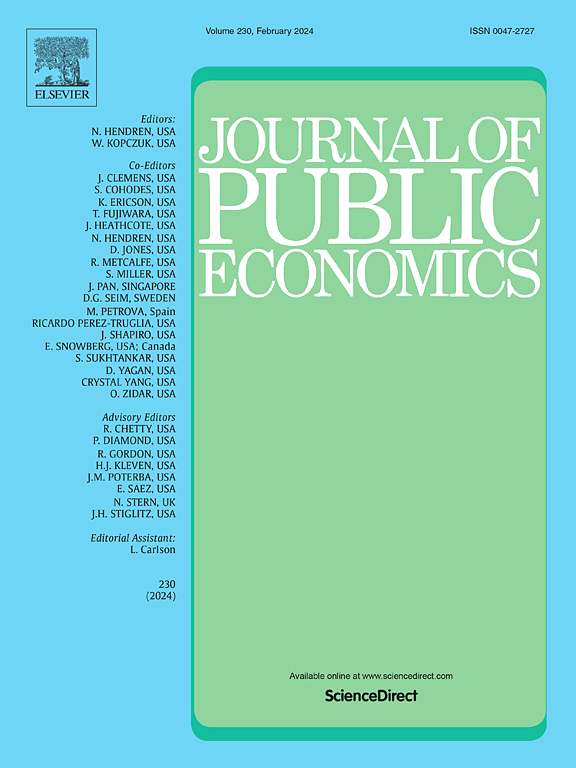关于不平等和支持再分配的本质的信念
IF 3.4
1区 经济学
Q1 ECONOMICS
引用次数: 0
摘要
关于不平等的信念取决于分配偏好吗?对不平等的偏好和信念在支持再分配中的共同作用是什么?我们在对一项高度再分配的政策提案进行投票的背景下,对瑞士人口中具有广泛代表性的样本进行了交错实验,研究了这些问题。我们的样本包括大多数不喜欢不平等的人,一大批利他的人,以及少数以自私为主的人。无论偏好类型如何,个人都高估了收入不平等的程度。信息干预成功地纠正了所有类型的这些重大误解,但基本上不影响对再分配的总体支持。然而,这些结果隐藏了重要的异质性,因为关于不平等的信念对再分配需求的影响是依赖于偏好的:只有反对不平等的个人,而不是自私和利他的人,会显著降低他们对再分配的支持。这些发现为一个看似令人困惑的结果提供了新的视角,即总体而言,对不平等的信念的巨大变化通常不会转化为对再分配需求的变化。本文章由计算机程序翻译,如有差异,请以英文原文为准。
Beliefs about inequality and the nature of support for redistribution
Do beliefs about inequality depend on distributive preferences? What is the joint role of preferences and beliefs about inequality for support for redistribution? We study these questions in a staggered experiment with a broadly representative sample of the Swiss population conducted in the context of a vote on a highly redistributive policy proposal. Our sample comprises a majority of inequality averse subjects, a sizeable group of altruistic subjects, and a minority of predominantly selfish subjects. Irrespective of preference types, individuals overestimate the extent of income inequality. An information intervention successfully corrects these large misperceptions for all types, but essentially does not affect aggregate support for redistribution. These results hide, however, important heterogeneity because the effects of beliefs about inequality for demand for redistribution are preference-dependent: only inequality averse individuals, but not the selfish and altruistic ones, significantly reduce their support for redistribution. These findings cast a new light on the seemingly puzzling result that, in the aggregate, large changes in beliefs about inequality often do not translate into changes in demand for redistribution.
求助全文
通过发布文献求助,成功后即可免费获取论文全文。
去求助
来源期刊

Journal of Public Economics
ECONOMICS-
CiteScore
14.10
自引率
2.00%
发文量
139
审稿时长
70 days
期刊介绍:
The Journal of Public Economics aims to promote original scientific research in the field of public economics, focusing on the utilization of contemporary economic theory and quantitative analysis methodologies. It serves as a platform for the international scholarly community to engage in discussions on public policy matters.
 求助内容:
求助内容: 应助结果提醒方式:
应助结果提醒方式:


